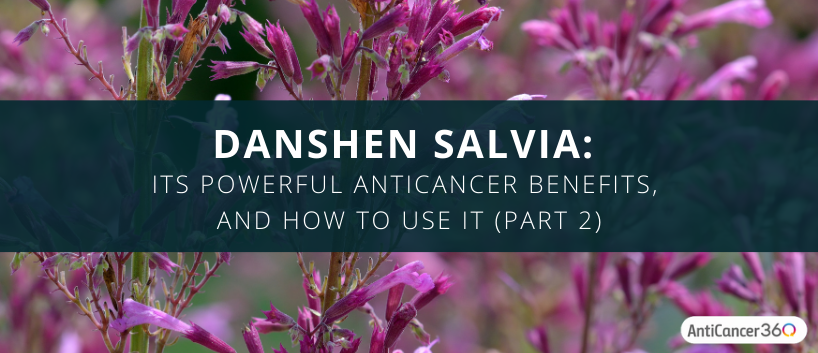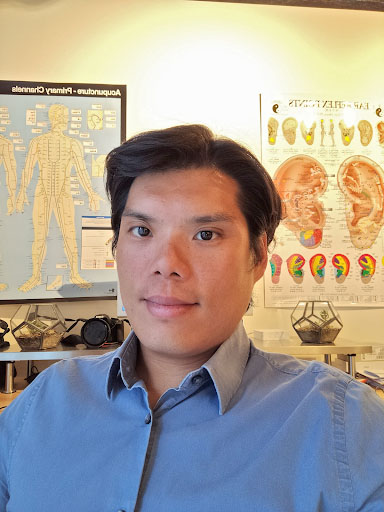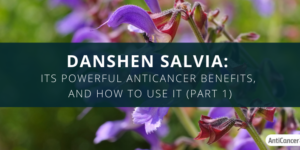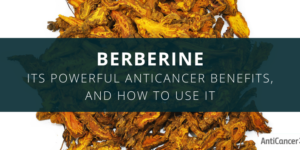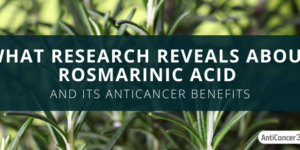Choosing an aggressive, integrated plan is especially crucial for later stage and difficult cancers. One strategy to consider is adding natural supplements – such as danshen salvia – that may have evidence-based anticancer benefits.
So, in Part 1 of this series, we looked at what danshen salvia is, and how it can weaken cancer cells. We saw how danshen impairs cancer cell metabolism through many different mechanisms. Without metabolic functions to efficiently convert nutrients (like sugar, fat, and protein) into energy, cancer cells can’t continue growing.
We also covered how to take danshen (common dosage, possible precautions, and interactions).
In today’s post, Part 2 of this series, we’ll explore several of the many scientific studies demonstrating danshen’s anticancer benefits. We’ll look at how danshen could enhance the cancer-killing action of some oncology treatments and how it could help protect your healthy cells against some of their side effects.
Danshen Salvia as Part of an Aggressive Integrative Approach to Cancer Treatment
As we covered in Part 1, Salvia miltiorrhiza, commonly known as danshen salvia or danshen, is a plant that has been used for thousands of years in traditional Chinese medicine. It’s been used primarily for heart health. But more recently, danshen’s powerful anticancer benefits have been explored.
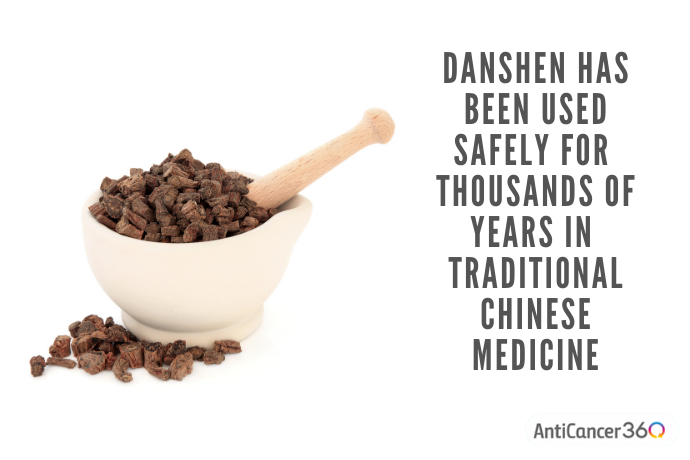
Some natural substances can help enhance the cancer-killing effects of cancer treatments, while others can help protect healthy cells against damaging side effects. Let’s take a look at how danshen might play a role in both.
Danshen May Enhance the Effects of Chemotherapy
Some studies have shown that water-soluble salvianolic acids in danshen have distinct antitumor effects related to nucleoside salvage.
Nucleosides are the building blocks of nucleic acids (DNA and RNA), which provide the genetic blueprints of every cell. Nucleic acids encode every amino acid and the protein complex.
Nucleoside transport is the first step in nucleoside salvage. This process collects the nucleosides that are formed during the degradation of DNA and RNA and recycles them. The salvage process is essential because some tissues cannot produce nucleic acids from scratch.
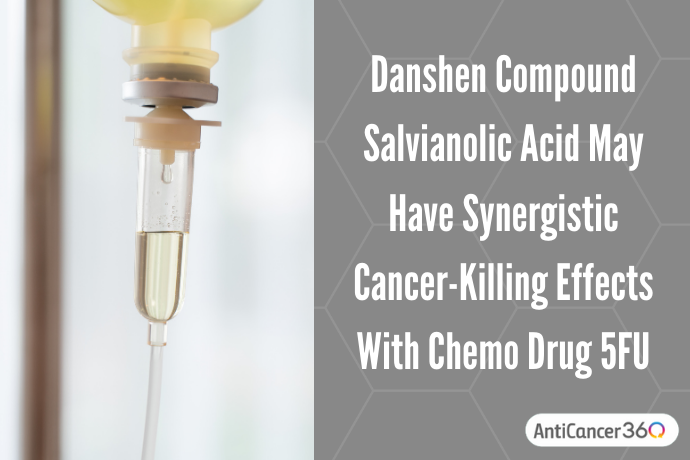
So, nucleoside salvage is an interesting area for cancer research and development since cancer cells can also utilize nucleoside salvage to survive [1].
Studies have established that the danshen compound salvianolic acid A blocks the transport of nucleosides in cancer cells. This blockage of nucleoside transport by salvianolic acid A may enhance the cancer-killing effect (cytotoxicity) of chemotherapy drugs [2].
In a 2004 study, scientists implanted human sarcoma (cancer of connective tissues) cells in mice. Then they tested the response to danshen components as well as various chemotherapy drugs. These researchers observed the following results in mice [3]:
- Treatment with salvianolic acid A reduced tumor growth by 14%.
- Treatment with 5-fluorouracil (5-FU) reduced tumor growth by 27%.
- Combination treatment of salvianolic acid AND 5-FU reduced tumor growth by 63%.
These exciting study results clearly show that danshen extract may create synergistic effects when used with certain chemotherapy drugs.
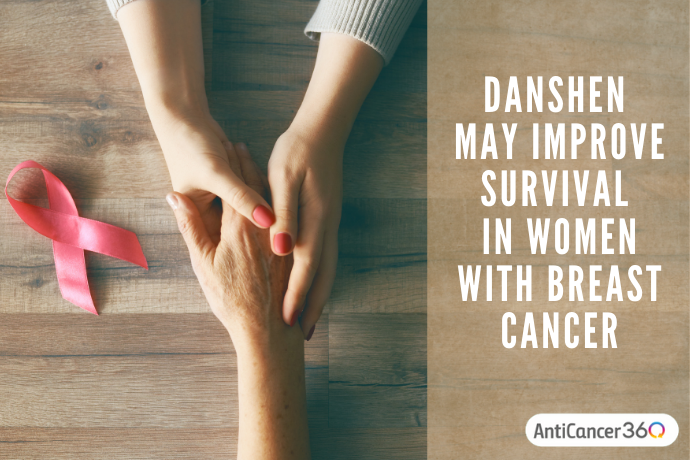
Several other studies show similar potential for danshen. A 2019 observational study suggests that danshen improved overall survival in women with breast cancer. The researchers observed that danshen helped to induce apoptosis (cell death) in breast cancer cells [4].
Danshen May Act as a Chemosensitizer
One of the biggest challenges when fighting some types of cancer is the development of resistance. Resistance occurs when a tumor that was previously responding (shrinking) with treatment suddenly begins growing again.
When cancer becomes resistant (stop responding), the treatment will sometimes have to be intensified (as in the increased dose of chemotherapy drug) or switched to a different, second-line chemotherapy regimen. Pushing the dose higher increases the risk of side effects. The second-line regimen could be less effective or have a higher risk of harmful side effects.
So you can clearly see why it would be beneficial to utilize strategies that could reduce resistance… and this is where natural supplements like danshen salvia may be useful.
There’s some evidence that danshen can act as a chemosensitizer. A chemosensitizer is a substance that can help reduce or reverse cancer cells’ resistance to chemotherapy.
Cryptotanshinone, a component of danshen salvia root, has been shown to have chemosensitizing effects and also promoted apoptosis (cell death) in ovarian cancer cells in a 2017 laboratory study [5].
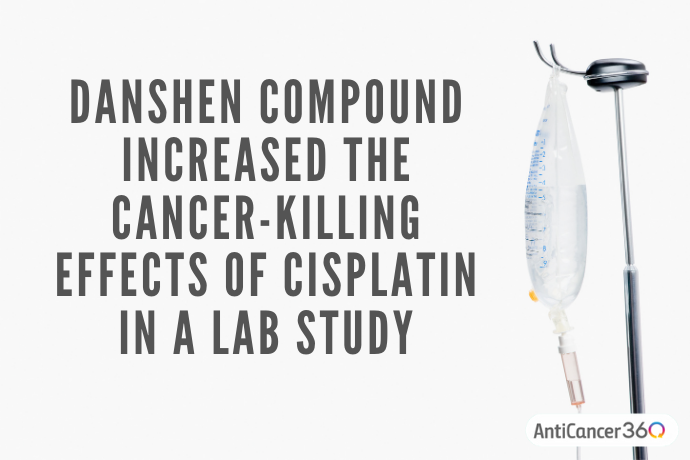
In another 2017 study, researchers compared the effects of cryptotanshinone to cisplatin, a chemotherapy drug. First, these scientists created drug resistance by exposing the ovarian cancer cells to low concentrations of cisplatin. Next, they divided the cancer cells into three groups and treated them with cryptotanshinone, cisplatin, or both [6].
The results showed that the combination of cryptotanshinone with cisplatin sensitized the ovarian cancer cells. In other words, the cryptotanshinone made the cancer cells overcome their resistance to cisplatin, and the combo treatment led to the most significant cell death. These scientists also observed that this effect was dose-dependent: when more cryptotanshinone was added, cisplatin effectively killed more cancer cells [7].
Upon further analysis at the molecular level, the researchers learned that cryptotanshinone seemed to cause cell death by blocking certain genes from being expressed and by activating the caspase cascade [8]. The caspases are a family of enzymes that signal each other in a stepwise (cascade) pattern and help control inflammation and cell death [9].
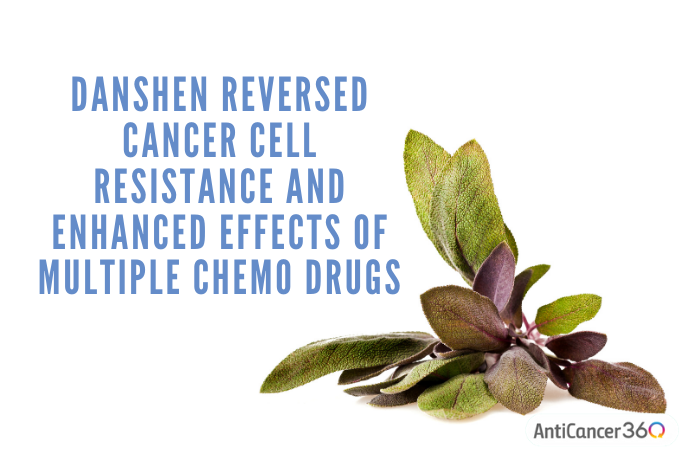
In another laboratory study, researchers explored how danshen component salvianolic acid B could affect multidrug-resistant colorectal cancer cells. (This means that these cancer cells were able to continue growing after being treated with several chemotherapy drugs.) The researchers first confirmed that the cells were resistant to the cancer-killing effects of four chemotherapy drugs: vincristine, 5-fluorouracil, cisplatin, and paclitaxel [10].
When salvianolic acid B was combined with each of these chemo drugs, more cancer cells were killed than with each drug alone. This research showed that the multi-drug resistance was reversed. By studying the molecular mechanisms, the researchers learned that salvianolic acid B was able to reverse multidrug resistance in two steps. First, salvianolic acid B seemed to increase reactive oxygen species (ROS) in the previously-resistant cancer cells. Second, the increased ROS seemed to signal certain cell proteins such as Bcl-2, Bax, and P-glycoprotein, all of which help regulate cell death [11].
Let’s look at another example of how the amazing danshen salvia root could have promising effects on glioblastoma, a type of brain tumor.
Glioblastoma is an extremely aggressive type of brain cancer. It is commonly treated with the chemotherapy drug Temodar (temozolomide). However, many glioblastoma tumors are resistant to Temodar from the start or quickly develop resistance to it [12].
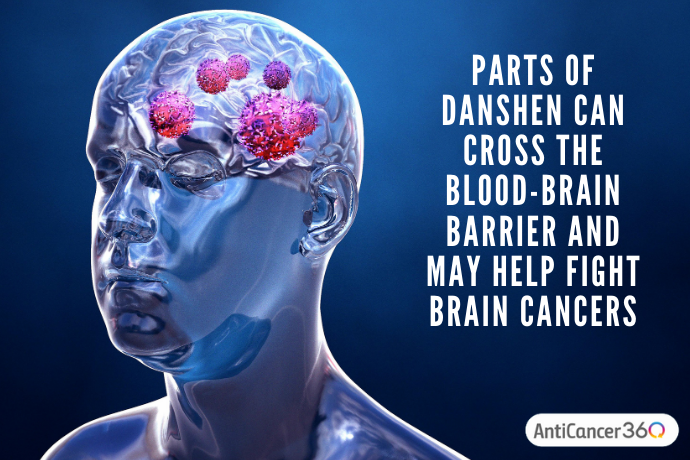
Dihydrotanshinone is one of the many components of danshen salvia, and it easily penetrates the blood-brain barrier. The blood-brain barrier is a protective boundary between the blood circulation and the brain. This boundary is highly selective and only allows certain substances to cross into the brain, protecting it from circulating toxins and infection [13].
In a laboratory study of glioblastoma cells, adding dihydrotanshinone to Temodar treatment demonstrated some powerful anticancer effects. Not only did this danshen component reverse the resistance to the drug, but it also had synergistic effects [14].
So, in this study, the combination of dihydrotanshinone with Temodar killed more glioblastoma cells than the total of the two separate treatments of dihydrotanshinone and Temodar [15].
So, with danshen in the cancer-killing equation, it is possible that “2 + 2 = 5”.
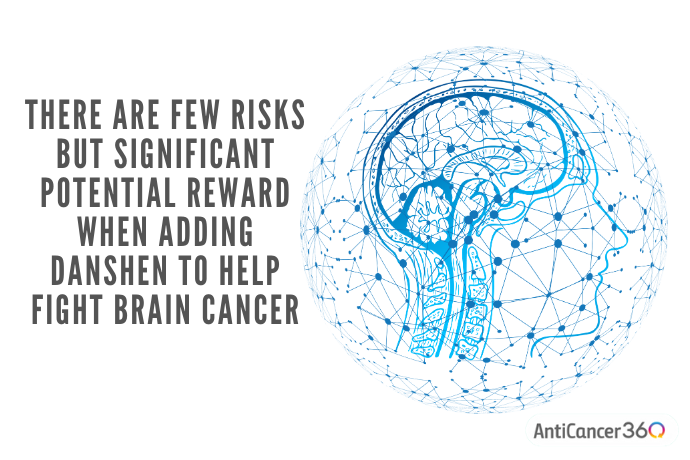
Other laboratory studies have repeated the same synergistic and sensitizing effects of dihydrotanshinone with Temodar [16]. So far, no known clinical trials have demonstrated these effects in humans. But, dihydrotanshinone has minimal risk of side effects… and glioblastoma tends to be aggressive. So, this is an excellent example of when a natural substance could enhance the effects of chemotherapy and potentially increase overall survival.
Danshen May Increase the Benefits of Radiation Therapy
Danshen may also potentially increase the benefits of another common type of cancer treatment: radiation. Unfortunately, like drug resistance with chemotherapy, resistance to radiation is a difficult challenge to overcome. But, danshen has shown some promising effects in laboratory radiation studies.
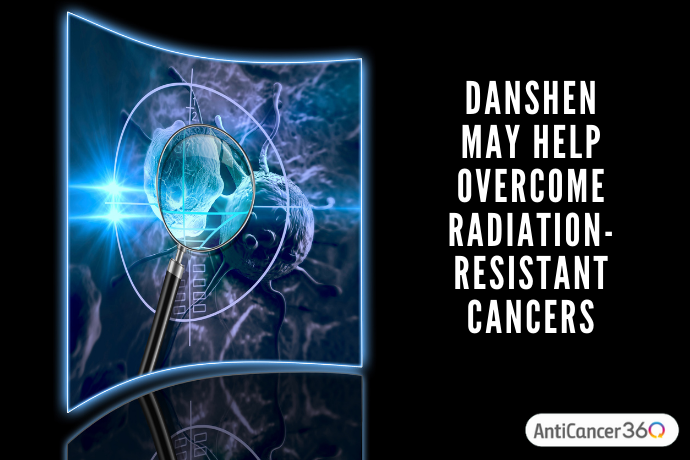
Researchers have observed that a tanshinone component of danshen is capable of enhancing the sensitivity of previously radiation-resistant lung cancer cells. This could potentially improve radiation effectiveness at shrinking tumor size [17].
A clinical study of danshen back in 1996 showed some potential benefit with radiation. In this study, 557 people with cancer of the head and neck were randomly divided into two groups. Group 1 received radiotherapy and a Chinese herb mixture containing danshen. Group 2 only received radiotherapy [18].
Short-term CT scan results showed that, on average, the people in Chinese herb group (group 1) had significantly higher complete response rates regarding the primary foci (where the cancer initially started growing).
However, there was no significant difference in the tumor shrinkage of involved lymph nodes (where the cancer spread). Still, this is an exciting study, and more clinical research would be useful in exploring how danshen could be further leveraged in the fight against cancer [19].
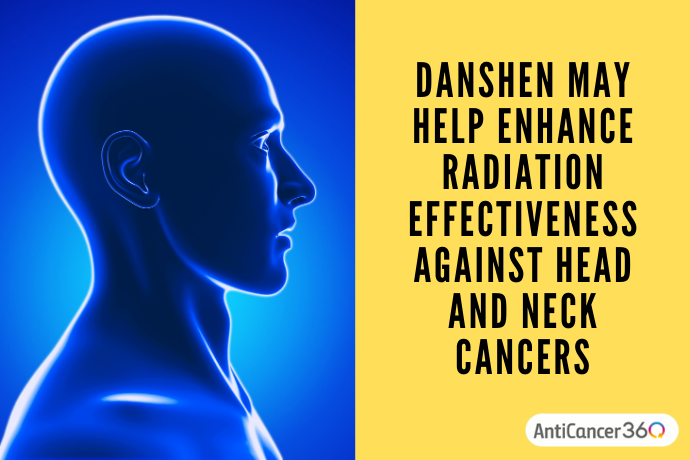
So, in addition to the many ways danshen salvia may enhance conventional cancer treatments, it can also potentially protect against severe side effects of these treatments.
Danshen Salvia as Side Effect Defense During Cancer Treatment
So besides the ways danshen salvia can help on the offensive side of fighting cancer, it may also defend against some toxic side effects of chemotherapy and radiation.
Adriamycin (doxorubicin) is a chemotherapy drug used to treat lymphoma, breast, thyroid, ovarian, and other cancers. It can be effective, but its use may be limited by its damaging side effects to the heart and liver [20]. But, it’s possible that some natural substances may be protective.
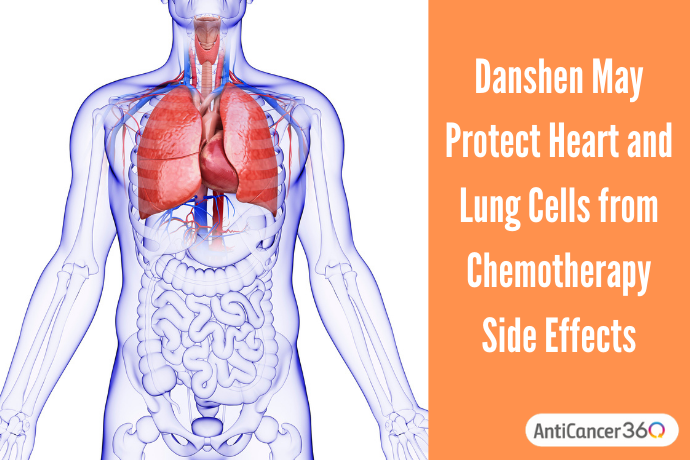
In an interesting study, researchers evaluated rats treated with danshen before and during treatment with doxorubicin, compared to rats treated with doxorubicin alone. Their analysis revealed that danshen appeared to reduce the extent of damage to the heart and lung tissues [21].
The protective effects of danshen were also demonstrated with another chemotherapy drug, 5-fluorouracil (5-FU). 5-FU can be an effective treatment for cancers of the breast, colon, and skin. Since it targets rapidly dividing cells, 5-FU is known for causing mouth sores (inflammation and ulcers of the oral mucosa). These mouth sores can be excruciating and may lead to dose reductions or treatment discontinuation. This would, of course, weaken the effectiveness of the chemotherapy [22].
The defensive effects of danshen against 5-FU-induced mouth sores were demonstrated in a study in human cells and also in hamsters. Danshen was administered into the animals’ peritoneal (abdominal) cavity, which is a common way that laboratory researchers evaluate a drug that is orally administered in humans. This is because the absorption rates into the bloodstream are similar [23].
After two weeks of dual treatment with 5-FU and danshen, the animals had significantly fewer mouth sores. These scientists concluded that danshen “promoted [healthy] cell proliferation in the oral mucosa and had protective effects against oxidative stress.” [24]
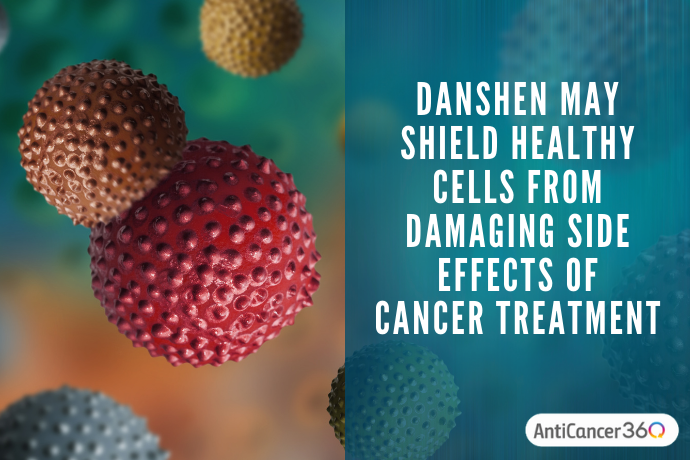
Danshen may also be protective against some side effects of radiation therapy. Radiation is highly effective against most types of head and neck cancers, but carries the risk of inner ear damage (ototoxicity), which may cause hearing loss. There is currently no effective method to protect against radiation-induced inner ear damage [25].
An exciting laboratory study compared the effects of radiation on two groups of inner ear cells. One group was pre-treated with tanshinone IIA, a danshen compound; the other group was not.
After equal exposure to radiation, the pre-treated cells preserved their structure and the cell nuclei (where the cell stores its DNA) remained oval-shaped and mostly in-tact. But, the untreated cells became deformed and swollen, and their nuclei were shrunken and broken into fragments [26].
The inner ear cells used in this study were from mice, and further studies could help confirm its clinical usefulness.
Another danshen compound, salvianolic acid A has demonstrated protective effects against radiation-induced apoptosis (cell death) in healthy human liver cells. This may show danshen’s potential in preventing liver damage [27].

The researchers observed that danshen seems to enact its protective effects by decreasing the production of reactive oxygen species (ROS) in the healthy liver cells and blocking certain cell signals that would otherwise lead to apoptosis [28].
Now, this is really interesting because earlier, in our discussion of how danshen can act as a chemosensitizer, salvianolic acid increased ROS and oxidative damage in cancer cells. But in healthy cells, its effects are just the opposite.
And again, these studies have been conducted under microscopes in controlled laboratory settings. But, overall, these studies clearly show the amazing anticancer potential of danshen.
These diverse natural compounds from the danshen salvia root seem to have a broad range of anticancer benefits. This includes its potential to starve cancer cells from nutrients, enhance the cancer-killing effects of cancer treatments, and protect healthy cells from their toxic side effects.
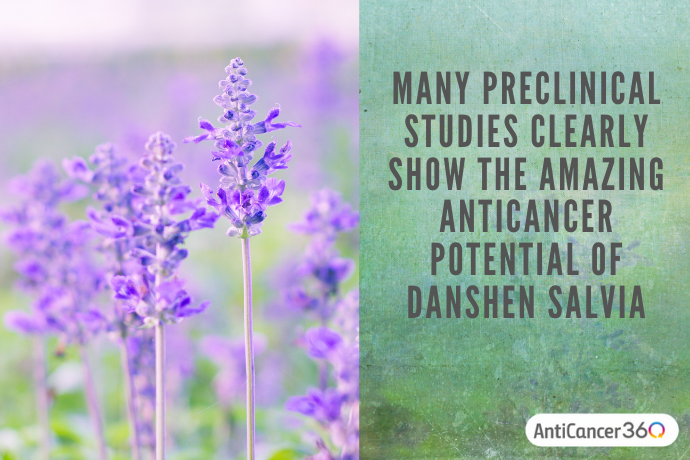
So… if you’d like to learn more about how to take danshen, you can read more about this in Part 1 of this article series.
Before starting danshen, or any natural supplement, you must consult with your healthcare provider.
Will Danshen Salvia Strengthen Your Personal Battle with Cancer?
Overall, there can be many potential benefits to adding a natural dietary supplement like danshen to your anticancer program.
When using the “Aggressive Integrative Approach” to cancer, the goal is to fight cancer from every possible angle. This approach includes integrating science-backed natural supplements to fight cancer, despite limited human studies. And, to use them in a safe way that won’t interfere with your oncology treatments.
Additionally, some natural supplements may help reduce side effects and improve the success of oncology treatments. And we can guide you on the appropriate use of natural substances with potential anticancer benefits to support your body from every angle.
So now we’d love to hear from you. How are you approaching your treatment plan? Are you taking any supplements? Have you tried danshen, and what has your experience been like so far? Let us know in the comments below!
If you’re interested in using an Aggressive Integrative Approach for your case… you can learn more about our program by watching one of our free online webinars.
Please discuss the risk-versus-benefit potential with your healthcare professional before starting any natural supplement, including danshen.
Are You A Candidate For Our Program?
If you’d like to learn more about the AntiCancer360 approach and see if we can help you… please watch our free online webinar to learn more about our approach. Then at the end, you’ll be able to schedule a free call with someone from our team so that we can discuss your case in more detail.
Dr. Patricia Weiser is one of AntiCancer360’s consultant pharmacists, science advisors, and medical writers. Her expertise helps us create safe herbal and supplement combinations and avoid potential drug interactions.
Patricia is a graduate of the University of Pittsburgh and a licensed pharmacist. She has clinical experience in both community and hospital pharmacy. She is passionate about integrative and preventative care and strives to empower her patients to take an active role in their health.

